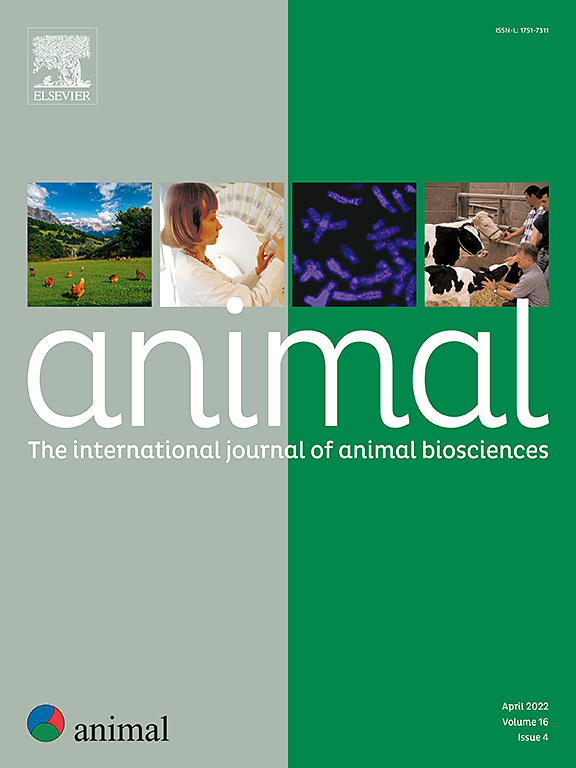产后奶牛子宫内膜巨噬细胞与子宫内膜炎持续存在的关系
IF 4.2
2区 农林科学
Q1 AGRICULTURE, DAIRY & ANIMAL SCIENCE
引用次数: 0
摘要
奶牛产后子宫内膜炎可自行恢复。早期的预测性诊断可以避免对恢复期奶牛进行不必要的治疗,从而限制抗菌素耐药性的出现,并为持续病例提供及时治疗。本研究首次对产后奶牛(n = 173)子宫内膜巨噬细胞(Mφ)的存在、比例和表型进行了表征。在产后21和42天(DPP)用Diff-Quickstained子宫细胞学玻片检测中性粒细胞(PMN)和Mφ计数。21 DPP后,恢复奶牛的Mφ比例高于持续子宫内膜炎奶牛,持续子宫内膜炎奶牛的PMN:Mφ比例高于恢复奶牛。免疫标记显示,在21 DPP时,恢复奶牛的M2 (CD163+)计数高于持续性子宫内膜炎奶牛,M1:M2比值低于持续性子宫内膜炎奶牛,而M1 (CD86+)计数无显著差异。在42 DPP采集的组织切片的免疫标记显示,持续性子宫内膜炎奶牛的总Mφ和M2计数高于恢复奶牛。综上所述,结果表明子宫内膜炎的持续存在与m - φ驱动(即m2驱动)促解决机制的延迟或失败有关。这表明21 DPP时子宫内膜Mφ含量有可能有助于预测奶牛产后子宫内膜炎的恢复或持续,并提示进行全面的验证研究。本文章由计算机程序翻译,如有差异,请以英文原文为准。
Associations between endometrial macrophages and persistence of endometritis in postpartum dairy cows
Cows can spontaneously recover from postpartum endometritis. An early predictive diagnosis could avoid unnecessary treatment of recovery cows thus limiting the emergence of antimicrobial resistance, and provide timed treatment to persistent cases. This study first characterised the presence, proportion and phenotype of endometrial macrophages (Mφ) in postpartum dairy cows (n = 173) with distinct endometrial health status. Neutrophils (PMN) and Mφ counts were evaluated in Diff-Quickstained uterine cytology slides at 21 and 42 days postpartum (DPP). At 21 DPP, the Mφ proportion was higher in cows later recovering than in cows with persistent endometritis until 42 DPP, and the PMN:Mφ ratio was higher in persistent than in recovery cows. Immuno-labelling showed that at 21 DPP, recovery cows had higher M2 (CD163+) counts and lower M1:M2 ratio than cows with persistent endometritis, whereas M1 (CD86+) counts were not different. Immuno-labelling of tissue sections from biopsy samples collected at 42 DPP showed that total Mφ and M2 counts were higher in cows with persistent endometritis than in recovery cows. In conclusion, results evidence that the persistence of endometritis is associated with a retarded/failure of Mφ-driven, namely M2-driven, pro-resolving mechanisms. This suggests that endometrial Mφ content at 21 DPP shows the potential to assist in predicting the recovery or persistence of postpartum endometritis in dairy cows, and prompts for comprehensive validation studies.
求助全文
通过发布文献求助,成功后即可免费获取论文全文。
去求助
来源期刊

Animal
农林科学-奶制品与动物科学
CiteScore
7.50
自引率
2.80%
发文量
246
审稿时长
3 months
期刊介绍:
Editorial board
animal attracts the best research in animal biology and animal systems from across the spectrum of the agricultural, biomedical, and environmental sciences. It is the central element in an exciting collaboration between the British Society of Animal Science (BSAS), Institut National de la Recherche Agronomique (INRA) and the European Federation of Animal Science (EAAP) and represents a merging of three scientific journals: Animal Science; Animal Research; Reproduction, Nutrition, Development. animal publishes original cutting-edge research, ''hot'' topics and horizon-scanning reviews on animal-related aspects of the life sciences at the molecular, cellular, organ, whole animal and production system levels. The main subject areas include: breeding and genetics; nutrition; physiology and functional biology of systems; behaviour, health and welfare; farming systems, environmental impact and climate change; product quality, human health and well-being. Animal models and papers dealing with the integration of research between these topics and their impact on the environment and people are particularly welcome.
 求助内容:
求助内容: 应助结果提醒方式:
应助结果提醒方式:


